Arctic Melt
The N Pole ice is disappearing at an astonishingly rapid rate. The polar ice at the N Pole is over water, not land,
and thus is subject to melting when warm water from the Pacific or the Atlantic is pushed up into the Arctic by the
Earth wobble caused by the presence of Planet X. Lately, several indicators have emerged. First, less of the Arctic
sea ice is being rebuilt each winter, after the summer melts.
- Arctic Sea Ice Drops to 2nd Lowest Level on Record
August 27, 2008
http://www.huffingtonpost.com/2008/08/27/arctic-sea-ice-drops-to-2_n_121970.html
- More ominous signs Wednesday have scientists saying that a global warming "tipping point" in the
Arctic seems to be happening before their eyes: Sea ice in the Arctic Ocean is at its second lowest
level in about 30 years. Arctic ice always melts in summer and refreezes in winter. But over the years,
more of the ice is lost to the sea with less of it recovered in winter. Sea ice also serves as primary
habitat for threatened polar bears. The most recent ice retreat primarily reflects melt in the Chukchi
Sea off Alaska's northwest coast and the East Siberian Sea off the coast of eastern Russia.
Second, the Arctic sea ice is not reaching the land masses on either side of the N Pole, as was the case just a few
years ago when the N Pole would be ice-locked during winter. Now, both the North-West and North-East
passages are open for the first time in the memory of man.
- North Pole An 'Island' For First Time In History
August 31, 2008
http://www.dailymail.co.uk/news/article-1050990/
- The North Pole has become an island for the first time in human history. Startling satellite pictures
taken three days ago show that melting ice has opened up the fabled North-West and North-East
Passages - making it possible to sail around the Arctic ice cap. The opening of the passages has been
eagerly awaited by shipping companies which hope they will be able to cut thousands of miles off their
routes. The pictures, produced by NASA, mark the first time in at least 125,000 years that the two
shortcuts linking the Atlantic and Pacific oceans have been ice-free at the same time. Many scientists
believe that the mass of ice that forms a jagged circle around the North Pole could vanish altogether
in the summer by 2030. Others believe it could take as little as five years for the Pole, currently frozen
all year round, to be ice-free between mid-July and mid-September. Four weeks ago, tourists had to
be evacuated from Baffin Island's Auyuittuq National Park in northern Canada because of flooding
from thawed glaciers. The park's name means 'land that never melts'.
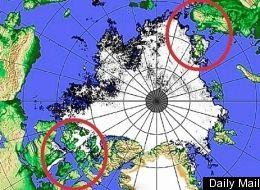
Third, a floating glacier off Greenland has started to break up, with a dramatic crack visible from space.
- New Greenland Ice Cracks Worry Scientists
August 21, 2008
http://www.huffingtonpost.com/2008/08/21/new-greenland-ice-cracks_n_120516.html
- In northern Greenland, a part of the Arctic that had seemed immune from global warming, new
satellite images show a growing giant crack and an 11-square-mile chunk of ice hemorrhaging off a
major glacier. And that's led the university professor who spotted the wounds in the massive
Petermann glacier to predict disintegration of a major portion of the Northern Hemisphere's largest
floating glacier within the year. If it does worsen and other northern Greenland glaciers melt faster,
then it could speed up sea level rise, already increasing because of melt in southern Greenland. The
crack is 7 miles long and about half a mile wide. It is about half the width of the 500 square mile
floating part of the glacier. Other smaller fractures can be seen in images of the ice tongue, a long
narrow sliver of the glacier.
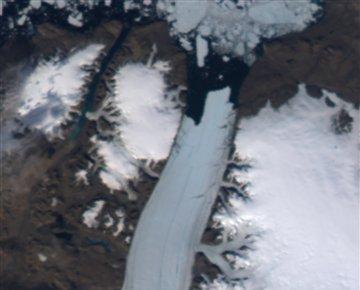
Where is all this leading? Human scientists have calculated that the sea level would rise 200 feet if all the ice at the
poles and all the ice covering Greenland were to melt. Just a fraction of that would be devastating to coastal
development all over the world. Many major cities are right on the water's edge. And such a sea rise would push the
oceans inland into the Mississippi Valley, the Amazon Basin and the lands of Siberia. Fertile croplands would be
inundated. The Zetas have stated that sometime after the pole shift, which they predict will happen before the year
2012, the poles will have completely melted, their locations having been shifted to the equator.
ZetaTalk Prediction 7/15/1995: After the cataclysms the existing polar ice will melt, while at the same time
reforming over the new poles. The melting will occur faster than the reforming, as for ice to form there are
more factors at play than for ice to melt. We will explain. The ice over the former poles will now be facing
the Sun, and the melt rate will proceed based on the air temperature and the absorption of solar rays, both
of which will be high as the old poles will now be situated essentially at the new equator. Any water at the
new poles will freeze, but the buildup of ice on a pole is not altogether from the water that happened to be
there when the pole took position. The buildup comes from precipitation, and this accumulates over
hundreds of years. At some point an equilibrium is established, with icebergs breaking off and floating to
warmer waters and the like. The Earth, therefore, will experience more water in its oceans for some time
after the cataclysms.
But this will do more than raise the sea level 200 feet. Per the Zetas, it will raise the sea level 650 to 700 feet.
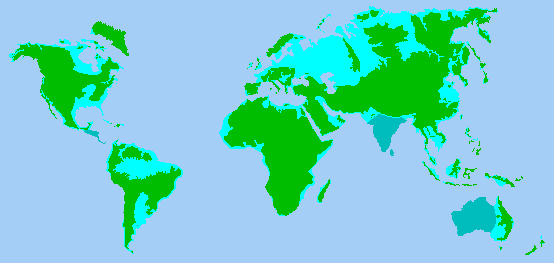
ZetaTalk Explanation 10/5/2002: In computing the rise in the seas to 675 feet, more than the melting of
Antarctic and Greenland ice is presumed, as this rise has been computed by man to be only 200 feet. What is
missing from this equation is swelling of land masses, land surface under the water, as odd as this concept
might sound. Metal is known to expand when heated, but the concept of hot mud being larger in volume
than cold mud has not been considered, as it has never been a concern of man's. Heat is particles in motion,
and they bump atoms about so that expansion is the result. Under the oceans, this equates to a higher ocean
bottom, with the water needing to go someplace, and as the bottom is moving up, the sea level can only go
up also.
Fay's Path
Tropical Storm Fay's path took some bizarre turns during the last week of August, making landfall afresh several
times. This is not typical, and in fact broke records for the largest number of landfalls ever for a tropical storm.
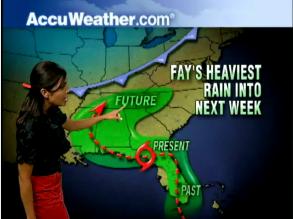
- Fay's 4th Florida Landfall One For The Record Books
August 23, 2008
http://www.huffingtonpost.com/2008/08/23/fays-4th-florida-landfall_n_120803.html
- Tropical Storm Fay crossed into the Florida Panhandle on Saturday, becoming the first storm of its
kind in recorded history to hit the state four different times. Though Fay never materialized into a
hurricane, downpours along its zigzagging path have been punishing and deadly. Fay has been an
unusual storm, even by Florida standards. It first made landfall in the Florida Keys on Monday, then
headed out over open water again before hitting a second time near Naples on the southwest coast. It
limped across the state, popped back out into the Atlantic Ocean and struck again near Flagler Beach
on the central coast. It was the first storm in almost 50 years to make three landfalls in the state, as
most hit and exit within a day or two.
The Zetas were asked about this bizarre behavior during the weekly live chat, and responded that it is a graphic
indication of the Earth wobble caused by the near presence of Planet X.

ZetaTalk Explanation 8/23/2008: This is a perfect example of what the Earth wobble is doing to the Earth
and her atmosphere. If one imagines being positioned on the Sun, looking at Earth when the Sun is over
Europe at high noon, one would not see the geographic N and S Poles in a straight up and down position, at
12 and 6 o'clock respectively. Instead, the N Pole would seem to be at 11 o'clock and the S Pole at 5 o'clock.
Then as the globe turns and high noon is over the Americas, the N and S Poles would appear to be at 1
o'clock and 7 o'clock respectively. What this does for the atmosphere over the Atlantic is first it masses over
the East Coast of the US, during the European lean, and then it masses over the Gulf of Mexico during the
Americas lean. The air masses shift positions. This is why Fay has gone back and forth across Florida,
instead of one of the usual routes that hurricanes take.
2008 Hurricane Season
We're all the way up to Josephine, out in the Atlantic, 10 of the 13 named storms predicted by Dr. William Gray,
the hurricane expert from Colorado State University.
- 13 Named Storms Predicted For 2008 Hurricane Season
April 05, 2008
http://www.cfnews13.com/Weather/HurricaneCenter/2008/4/4/
- Dr. William Gray, Dr. Phil Klotzbach and the rest of the team from Colorado State University spoke
to the meteorologists and emergency managers at the conference. They said their prediction of 13
named storms and seven hurricanes will probably be raised next week as there are signs of a more
active season.
NOAH predicts an above average hurricane season for 2008 too. But then, they predicted this for 2007 too and it
was relatively mild.
- Hurricane Season 2008-Predictions
http://www.infoplease.com/spot/hurricanes.html
- Experts predict that the 2008 Atlantic hurricane season, which begins June 1 and ends November 30,
has a 65% chance of being above normal in activity. "NOAA scientists predict 12 to 16 named
storms, with six to nine becoming hurricanes, of which two to five could become major hurricanes of
Category three strength or higher," said a NOAA official. An average season sees 11 named storms,
with six becoming hurricanes, including two major hurricanes.
-
- Hurricane Season 2007-Review
http://www.infoplease.com/spot/hurricanes.html
- Hurricane season 2007, although predicted to be more active than usual, blew through rather quietly.
Of the six hurricanes and four tropical storms of the season, only two made landfall in the Atlantic
Basin at category five strength: Dean and Felix. Hurricane Dean came first, in August, and hit land
near Costa Maya, Mexico. Felix, a category five hurricane, formed over the Caribbean in early
September, and reached land in Punta Gorda, Nicaragua, where it produced heavy rains and
flooding. It also affected the Netherlands Antilles, Belize, Guatemala, and Honduras, and was blamed
for 130 deaths in Nicaragua and Honduras.
2008 has been a mild season too. Hurricane Gustav weakened to a Category 2 before hitting landfall during the first
day of the Republican Convention at St. Paul. Can we get the Zetas to predict what's coming next, and where it will
hit? Unfortunately not, as the rules require them to be mum about such issues.
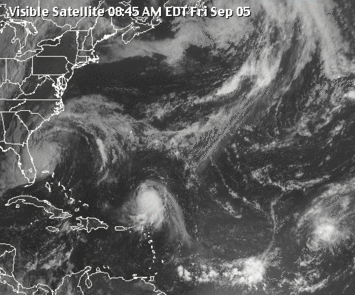
Question: Can the Zetas comment on this coming hurricane season apart from what they have already stated about
the linear increase in frequency and severity? I somehow feel this season will be bad indeed.
ZetaTalk Answer 4/28/2007: We have stated early in the ZetaTalk era that hurricanes would increase in
strength and ferocity but not beyond what the human population experiences today, and this is what has
been occurring. We have also predicted that hurricanes and tornadoes would occur in places not used to
experiencing them, and this also has occurred. Beyond this level of hurricane and tornado prediction we are
not allowed, by the rules, to warn mankind. Your Earth is a schoolhouse, where you learn by your decisions
and actions taken about your intended spiritual orientation. You are to be surprised by what occurs, disease,
starvation, storms. You are to rise to the occasion and help your fellow man. If you are constantly warned,
then no such decisions and actions would be taken by most, who would simply protect themselves. Thus,
surprise is part of the formula.
Never mind the answer, the public keeps hammering. After all, the Zetas have an excellent track record predicting
Earth changes, and hurricanes are a minor part of the overall scenario. "Come on! Can't you give us a hint?"
Question: Without getting into any hurricane predictions, can the Zetas explain what factors so far, are
hindering any ones from developing this season? The last 2 years, pre-hurricane season was predicted to
have many but fizzled out.
ZetaTalk Answer 8/4/2007: Hurricane predictions are off target because the forecasters are not taking into
consideration the right factors. They ignore the wobble which moves land under the atmosphere so the
temperature of the land and air mingle and equalize. They ignore the new position of the Moon, which pulls
on water by gravity as the Earth turns under it. They ignore the mild sloshing of the oceans during the
wobble, which changes the temperature of a water mass by this mixing process. While the hurricane season
has been mild, tornadoes have appeared in unusual places, and certainly drought and deluge have been
devastating around the world. It is not just the hurricane season that has proved unpredictable. This
inability to predict the weather in general will continue and in fact get worse, as we long ago predicted.
Question: What is the Zeta's take on the predictions of number of hurricanes they say will make land fall
this year? And will the tornados continue along with the hurricanes?
ZetaTalk Answer 6/7/2008: The hurricane season will not be as tumultuous as the tornado season for the
US, as the wobble keeps these storms out into the Atlantic, away from the coast. They may be numerous,
but fewer will make landfall.
However, there was a very interesting admission by the Zetas regarding Gustav. This hurricane was deliberately
steered toward New Orleans and timed to hit during the Republican convention!
Question: Will Gustav be the final nail in the coffin of the Republicans? Is any of this by design?
ZetaTalk Answer 8/30/2008: Such a remarkable coincidence that Hurricane Katrina redux is about to occur
on the day Bush and Cheney are to speak at the Republican convention! This is the second time around for
the New Orleans area, and they are correctly evacuating, leaving no one behind. Since this area will be
flooded repeatedly by storms well before the pole shift, one should not have regrets about this, as it hastens
the realization of the inevitable death of New Orleans as a viable city. Thus, directing a storm to that area is
not a disservice to the humans attempting to live there. The Republicans will try to point out that a
Republican governor did better than the prior governor, a Democrat, as a thorough evacuation is being
mandated and funded. Of course, they had the lessons from the first Katrina disaster. The nation will recall
the days of the first Katrina, however, and how a Republican president in the White House was dismissive of
human life put in danger on his watch.
You received this Newsletter because you Subscribed to the ZetaTalk Newsletter service. If undesired, you can quickly Unsubscribe.
|

